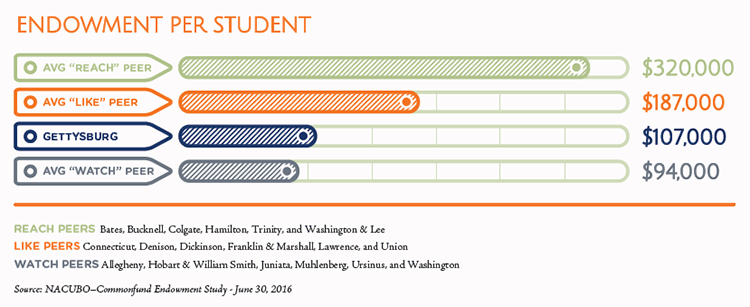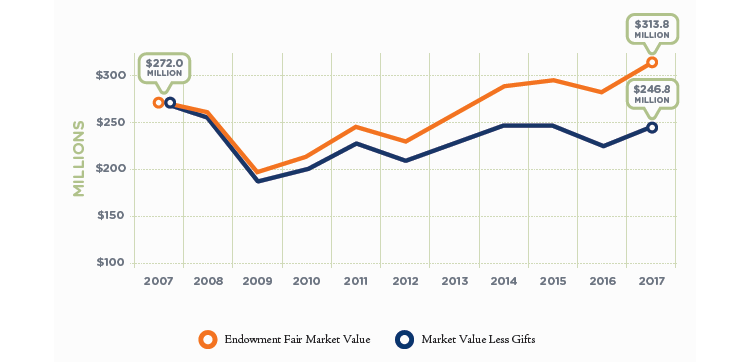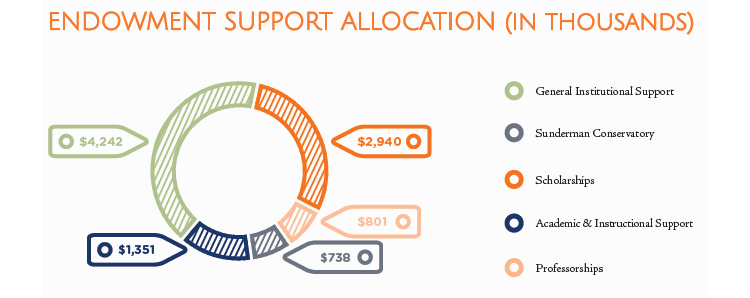Every fall, colleges and universities from across the country await the latest rankings by U.S. News & World Report. In 2017, Gettysburg College was listed as number 46 among the top 50 liberal arts colleges in the nation.
A close look at the rankings reveals a correlation between the size of a school’s endowment and all other measures of quality, prestige, and staying power. It’s simple: the greater the endowment per student, the higher the ranking is likely to be.
While endowment is not officially part of the ranking’s criteria, it’s clear that the wealthier institutions are winning out.
Why?
A liberal arts education is defined by the individualized student experience. From one-on-one mentoring with faculty-scholars to experiential opportunities tailored to a student’s desired career path—these personalized offerings are now expected by today’s high school prospects. And these experiences don’t come cheap.
Institutions with larger endowments have the means to customize their offerings across the curriculum and appeal to a broader range of incoming students, leaving schools with more modest endowments at a distinct disadvantage.
How does Gettysburg College fare?
According to the most recent National Association of College and University Business Officers (NACUBO)- Commonfund study of endowments, Gettysburg’s endowment per student was roughly $107,000 in 2016. That means Gettysburg has $80,000 less in resources to support each student than our closest competitor cohort, which includes Franklin & Marshall and Dickinson, and nearly $215,000 less than wealthier institutions we compete against for students, like Bucknell and Hamilton.
“Our lower endowment balance affects some of our national rankings, which can influence parental and student college choices,” said James L. Chemel ’71, Board of Trustees chair. “This endowment disparity also affects all of our students each and every year, because income from the endowment provides funds for student scholarships, support for our faculty, and overall budget relief, which supports all our students.”

Funding the Gettysburg experience
The College’s endowment is meant to provide financial support for the College’s mission in perpetuity—that is, forever.
To understand “forever,” scale it to an individual. To ensure a client achieves fiscal security over the course of their lifetime, a financial advisor would recommend that the client manage their income for day-to-day expenses, savings, and investments for long-term financial strength and stability.
The same holds true for Gettysburg College.
The College operating budget is akin to a personal budget: money comes in—in Gettysburg’s case, through tuition and room and board—and those funds are used to pay for everyday expenses.
But there’s a twist. Net student revenue—although significant—does not cover the total cost of running the College in today’s hyper-competitive higher education environment. More funds are needed.
“The College is a subsidized operation,” said Vice President for Finance and Administration Daniel Konstalid. “While public institutions are subsidized by the state, private institutions like Gettysburg are subsidized by the generosity of their donors. We are dependent on their annual gifts to inject funds into our operating budget.”
These annual gifts are how the vast majority of alumni, parents, and friends donate to Gettysburg—and these gifts are essential for helping the College meet its most pressing needs. To address the year’s remaining expenses, the College turns to income from its endowment.
Impact of endowment gifts sine FY2008

Investment performance
Gettysburg College investments realized a 10-year average weighted return of 4.8 percent through 2016—exceeding the College's portfolio policy benchmark of 4.4 percent and in keeping with the average 4.8 percent returns of endowments of similar size.
The endowment and how it works
An endowment is often misunderstood as a war chest in which every dollar is immediately available for use.
In reality, the College’s endowment is far from a bottomless hoard of cash. With an aggregate market value of $314 million, Gettysburg College’s endowment is a collection of more than 700 individual funds given by donors who believe that Gettysburg College and its most cherished offerings should endure forever.
The endowment is a long-term investment rooted in who we are and why we matter.
“What’s important to remember is that many of the assets that make up our endowment need to be managed based on agreements we’ve made with individual donors, so as a result, this core is restricted in perpetuity,” said Konstalid.
These restricted funds—roughly 69 percent of the total endowment—support specific campus priorities, including endowed scholarships and professorships, the Sunderman Conservatory of Music, and the Majestic Theater.
Over the decades, Gettysburg supporters have given both restricted and—on occasion—unrestricted gifts to the endowment. The principal of that endowment is then invested in accordance with policy guidelines established by the College’s Board of Trustees.
The Board charges our Endowment Committee with oversight responsibility for the endowment. As with other similarly sized endowments, the committee uses an investment advisor (Cambridge Associates) to provide comprehensive investment planning, management, and performance reports—ensuring excellent ongoing stewardship of the endowment.
From there, a portion of the endowment—typically around 5 percent each year—is distributed to the College to satisfy current funding needs, such as operations and financial aid. The remainder continues to be invested.
It’s a straightforward process, but one that is vital to the College’s financial footing.
“At the most basic level, we need to maintain intergenerational equity—supporting the same exceptional level of activities and programs in the future as we do today,” said Konstalid.

Narrowing the endowment gap
The question remains: how do we build our endowment for the future—bridging the divide between Gettysburg College and its competitors—while continuing to support an exceptional educational experience in the present?
“I think that is one of the biggest tensions we feel in fundraising,” said Robert Kallin P’12, vice president for Development, Alumni and Parent Relations. “We know a campus priority or program needs funding today, but we’re also being short-sighted if we don’t secure funding for tomorrow. It’s a tricky balance, but I believe we’ve achieved that so far during our Gettysburg Great Campaign.”
Take scholarship support, for instance.
Before 2011, Gettysburg had 334 scholarships with a combined endowment of $44 million. Today, in the final year of the comprehensive campaign, the College has 432 scholarships with a combined endowment of $75 million. The best part is that 517 students were awarded endowed scholarship funds this year, and since these funds are endowed forever, they’ll impact generations of future Gettysburg students.
“It is to the College’s advantage for us to permanently underwrite an ongoing operating expense anytime we have an opportunity,” said Kallin. “Sometimes a donor wants to provide $100,000 for a Gettysburg scholarship when he or she passes. This is a wonderful commitment; however, one of the great joys of giving is witnessing the impact you’re having on today’s students. I often encourage donors to consider giving a portion of their estate provision while they are alive.
“We work closely with our donors and respect the fact that giving is a very personal decision. We want to help them achieve their philanthropic goals without compromising their ability to achieve other important personal goals of providing for themselves and their family.
“Whether it is a straightforward bequest, an IRA rollover contribution, a gift of real estate, or something more complex, it is very gratifying to show donors how they can provide more than they imagined to the people and causes for which they care deeply and to concurrently reduce their income and estate tax burden.”
How you can help
“To ensure a vibrant future for Gettysburg, it’s vitally important that you give to our endowment,” said Chemel. “This kind of gift will enhance your legacy by providing many years of financial support to this wonderful institution.”
Loyal supporters are invaluable shareholders in the experiential education Gettysburg College provides. To learn how you can help Gettysburg remain forever great, contact Emily Clarke at eclarke@gettysburg.edu for more information about making an endowed gift.